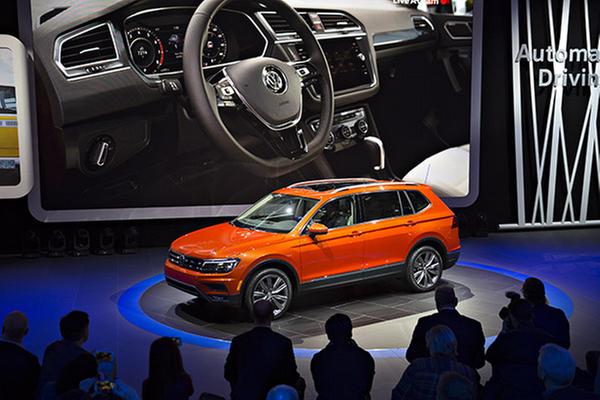VW sleuths say Fiat Chrysler diesels spew excess pollution
Updated: 2017-06-19 07:02
 |
| A VW model catches visitors' eyes at an auto show in Detroit, the United States. [Photo provided to China Daily] |
Fiat Chrysler diesel vehicles spewed pollution as much as 20 times the legal limit, according to testing by the same researchers who first recorded the excess emissions in Volkswagen's diesel cheating scandal.
The results shed new light on the United States Justice Department's allegations in a civil lawsuit last month that Fiat Chrysler Automobiles has used illegal "defeat devices", software that helps evade emissions tests.
It comes amid growing concerns about the ability of diesel engines to satisfy US emissions limits and the extent to which automakers navigated around them.
The West Virginia University's Center for Alternative Fuels, Engines and Emissions stopped short of accusing Fiat Chrysler of emissions cheating, but said on-road tests of Jeep Grand Cherokee SUVs and Ram 1500 pickups revealed nitrogen oxide levels at three to 20 times what is permitted by US clean-air rules. Nitrogen oxide, or NOx, can cause smog and acid rain.
"We saw emissions results in simulated on-road cycles on chassis dynamometers that were much lower than the actual on-road results were, suggesting that the vehicle was controlled in different fashions," said Daniel Carder, director of the center.
The researchers tested five of the Jeep and Ram models from model years 2014 and 2015 in laboratories and on the road using portable equipment to measure emissions.
The vehicles emitted pollution during on-road tests in excess of US limits. The on-road emissions were also higher than observed in laboratory tests designed to replicate road tests.
Fiat Chrysler said it has asked for more information about how the study was conducted but "this testing appears to have been commissioned by a plaintiffs' law firm for purposes of litigation". Carder declined to comment on who commissioned the research.
US pollution standards for emissions are based on laboratory testing, so a comparison with on-the-road tests is "invalid", the company said.
The researchers appear to have obtained some of the results by driving faster and with more weight in the vehicle than the regulators call for, according to the company's statement. "Despite the report, there is no regulatory protocol for conducting on-road emissions testing," the company said.
Carder acknowledged that some of the on-road tests were more demanding than US laboratory procedures such as a test route on a steep ascending road.
However, "we were seeing elevated NOx levels even on the ascent, which is something we wouldn't expect," Carder said, adding that even though an engine works harder going uphill, emissions can be lower due to the way exhaust treatment systems work.
In its civil lawsuit against Fiat, the US argues that any undisclosed software is illegal and that features within the automaker's emissions control systems were designed to evade emissions tests.
The case focuses on diesel engines in Jeep Grand Cherokee SUVs and Ram 1500 pickups for model years 2014 to 2016, alleging that they generate more emissions in normal driving than during laboratory tests.
Fiat Chrysler CEO Sergio Marchionne has said the automaker never set out to cheat emissions tests.
In a statement last month, the Italian-American carmaker said it intends to vigorously defend itself "particularly against any claims that the company engaged in any deliberate scheme to install defeat devices to cheat US emissions tests".
Separately, General Motors was sued on May 25 for allegedly putting defeat devices in two models of heavy-duty trucks from 2011 to 2016.
The class-action suit by owners or leasees of more than 705,000 GM Duramax diesel trucks argues that the vehicles passed US inspections despite spewing emissions two to five times the legal limit.
The Morgantown, West Virginia center that conducted the Fiat Chrysler tests has played a central role in emissions cheating scandals before, having documented outsize emissions as much as 35 times what was expected during testing of Volkswagen vehicles in 2013.
Those tests were commissioned by the nonprofit International Council on Clean Transportation, a group that works closely with regulators worldwide and helped drive later lawsuits against Volkswagen.
In the Volkswagen tests, the center monitored emissions by driving vehicles while portable measuring equipment was attached via hoses to their exhaust pipes.
Carder declined to discuss other diesel vehicles tested by the West Virginia University lab.
Volkswagen admitted in 2015 that about 11 million diesel cars worldwide were outfitted with so-called defeat devices.
The scandal has cost the German automaker 22.6 billion euros ($25.4 billion) so far, with numerous investigations and lawsuits still pending.
It's a difficult burden of proof for the government and plaintiffs in the Fiat Chrysler lawsuit to "really come up with a smoking-gun piece of evidence - 'smoking' the key word here - that there was in fact intent to cheat the testing for emissions", said Richard Hilgert, an analyst at Morningstar, who has a buy rating on Fiat Chrysler.
"This is a negotiation," Hilgert said. "We're going to see some kind of settlement at some point."
Carder said in a telephone interview that finding a "smoking gun" is not the objective of his lab's diesel tests.
"Our intent is to look at how these emissions controls systems are performing in the real world," Carder said. "We think that's where it really matters."
BLOOMBERG
























